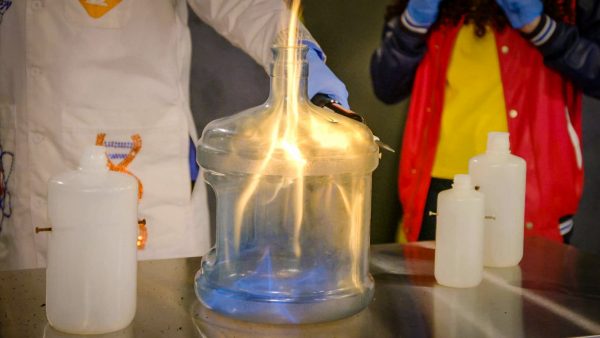Generator Definition
A generator converts energy from one form to another. For example, it can turn wind energy into electricity.
View Lesson on Renewable vs. Nonrenewable Resources
Become a member to get full access to our entire library of learning videos, reading material, quiz games, simple DIY activities & more.
Become a member to get full access to our entire library of learning videos, quiz games, & more.
Plans & Pricingto watch this full video.

Access All Videos
and Lessons, No Limits.
Access All Videos

No credit card required,
takes 7 sec to signup.
No card required

Ready-to-go lessons
that save you time.
Ready-to-go lessons
If you are on a school computer or network, ask your tech person to whitelist these URLs:
*.wistia.com, fast.wistia.com, fast.wistia.net, embedwistia-a.akamaihd.net
Sometimes a simple refresh solves this issue. If you need further help, contact us.
Renewable vs. Nonrenewable Resources
Fun Facts
- When flowing water turns a waterwheel, it can power a generator.
- Burning fossil fuels to power generators releases chemicals into the air and water.
- Solar collectors and generators use costly materials that can make them expensive to produce.
Why Do We Need To Know About Generator
Learning about generators helps us understand how we turn one type of energy into another. This is important for making electricity in places like power plants. This process keeps our homes and businesses running.
Knowing about generators is useful in many jobs, like in green energy, car design, especially electric cars like Tesla, and creating better batteries. This knowledge can help you in the future.
Frequently Asked Questions
Check out the Full Lesson on Renewable vs. Nonrenewable Resources
In this lesson, we learn that:
- Fossil fuels are sources of energy made from prehistoric plants and animals.
- Non-renewable energy comes from sources that could eventually run out.
- Renewable energy comes from sources that can be easily replenished.
- Renewable energy includes sunlight, wind and water power.
Related Topics
- Batteries Definition
- Chloroplast Definition
- Circulatory System Definition
- Comparative Anatomy Definition
- Compound Definition
- Definition Of Engineering
- Digital Signal Definition
- Ecosystem Definition
- Electromagnet Definition
- Electromagnetic Spectrum Definition
- Fossil Record Definition
- Generator Definition
- Genetic Factors Definition
- Geologic Processes Definition
- Glacier Definition
- Group Behavior Definition
- Heating And Cooling Definition
- Landform Definition
- Limited Resource Definition
- Lunar Mare Definition
- Marsupial Definition
- Mineral Definition
- Mitochondria Definition
- Molecule Definition
- Multicellular Definition
- Natural Disaster Definition
- Newton’s 1st Law Of Motion Definition
- Newton’s 3rd Law Of Motion Definition
- Non-renewable Energy Definition
- Nonrenewable Resource Definition
- Ocean Current Definition
- Photosynthesis Definition
- Physical Change Definition
- Physical Map Definition
- Pollination Definition
- Pollution Definition
- Push Definition
- Renewable Energy Definition
- Renewable Resource Definition
- Seed Dispersal Definition
- Seeing Definition
- Seismologist Definition
- Solid Definition
- Solubility Definition
- Taxonomy Definition
- Virus Definition
- Watershed Definition
- Weather Map Definition


Start a Free Trial Today. Get a $5 Amazon Gift Card!
Teachers! Start a free trial & we'll send your gift card within 1 day. Only cards left. Try it now.
Select Grade
Select Subject
This email is associated with a Science Kit subscription. Kit subscriptions are managed on this separate page: Manage Subscription

-
Download InvoiceScience & Math$/yr
-
Download InvoiceScience Only$/yr

access all lessons
• No credit card required •
"My students loved the videos. I started the video subscription in May and used them as a review before the state test, which I know contributed to 100% of my class passing the state test."
Rhonda Fox 4th Grade Teacher, Ocala, Florida
Use Generation Genius in Your School
Access all lessons free for 30 days.
"My students loved the videos. I started the video subscription in May and used them as a review before the state test, which I know contributed to 100% of my class passing the state test."
Rhonda Fox 4th Grade Teacher, Ocala, Florida
• No credit card required •
Already a member? Sign In
* no credit card required *

* no credit card required *
* no credit card required *

Get District Quote
Discounts start at 3 schools.
Sent!
Thank you for your inquiry.
We will email you a quote as soon as we can.

to Discover the Benefits of Generation Genius
Learn How to Save for Your School & District!
Please login or create an account to access additional resources

no credit card required
Skip, I will use a 3 day free trial
Enjoy your free 30 days trial
-
Unlimited access to our full library
of videos & lessons for grades K-5. -
You won’t be billed unless you keep your
account open past your 14-day free trial. -
You can cancel anytime in 1 click on the
manage account page or by emailing us.
-
Unlimited access to our full library of videos & lessons for grades K-5.
-
You won't be billed unless you keep your account open past 14 days.
-
You can cancel anytime in 1-click on the manage account page.
Cancel anytime in 1-click on the manage account page before the trial ends and you won't be charged.
Otherwise you will pay just $10 CAD/month for the service as long as your account is open.
Cancel anytime on the manage account page in 1-click and you won't be charged.
Otherwise you will pay $10 CAD/month for the service as long as your account is open.
We just sent you a confirmation email. Enjoy!
Done



























































































































 GENERATION GENIUS
GENERATION GENIUS